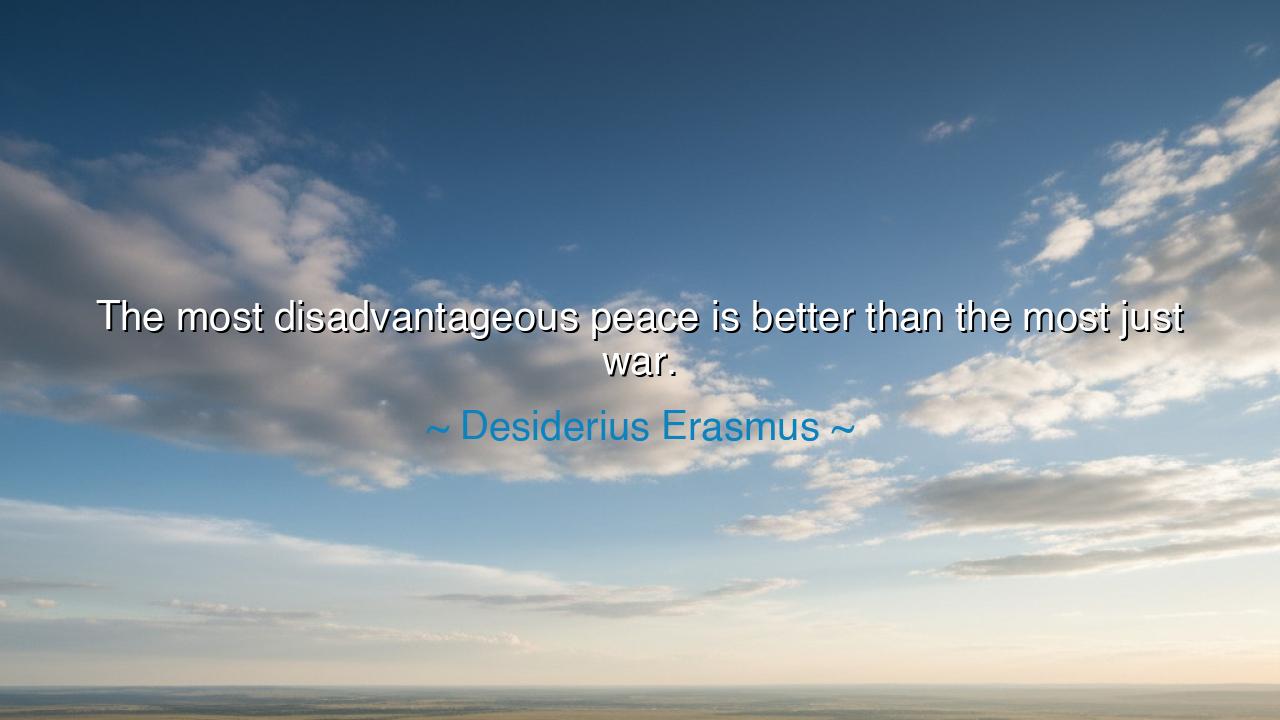
The most disadvantageous peace is better than the most just war.






Hear the solemn wisdom of Desiderius Erasmus, the great humanist of the Renaissance: “The most disadvantageous peace is better than the most just war.” These words ring like a bell through the centuries, calling mankind to reflection. They are not the words of the coward, nor of one blind to injustice, but of a sage who had witnessed the endless suffering of his age. Erasmus saw kingdoms torn apart by greed and faith twisted into sword and fire. He knew that even the just war, so nobly argued in the tongues of kings, leaves behind widows, orphans, famine, and silence where songs once lived.
Consider the meaning: even a peace that burdens us, even one that denies us honor or advantage, still guards life, still spares blood. What is a just war, even when fought for truth or liberty, but the unleashing of destruction upon the innocent? In war, fields are burned, cities crumble, and the young die before they can bear children. A broken peace may wound our pride, but war wounds the very body of mankind. Thus Erasmus places the scale before us: on one side, humiliation; on the other, annihilation. He tells us it is better to endure the former than embrace the latter.
History testifies. Look to the Thirty Years’ War in Europe—a conflict born of faith and righteousness, waged in the name of holy truth. What did it yield? Entire regions depopulated, villages erased, and a continent scarred with famine and plague. The victory of one side or the other mattered little compared to the centuries of loss it brought. Contrast this with the Treaty of Westphalia, though flawed and imperfect, which at last restored peace. Though neither side gained all it wished, though the terms were bitter to some, it was still better than the endless death that had consumed generations. Erasmus’s words stood vindicated: the worst peace was more merciful than the most justified war.
Even in more recent times, we see the lesson repeated. Consider the uneasy peace of the Cold War, stretched across decades like a taut bowstring. It was filled with suspicion, fear, and rivalry. Yet, despite its anxieties, this long and disadvantageous balance spared the world from plunging into a third great war, a war that would have burned nations with nuclear fire. Imperfect peace guarded the survival of civilization itself, while the “just” war each side imagined would have ended all things.
Erasmus’s wisdom also pierces into our personal lives. How many quarrels, born of pride and self-righteousness, destroy families and friendships? We cling to the justice of our cause, ready to fight until the other bends or breaks. Yet what remains when the war of words is done? Bitterness, division, silence between brothers and sisters, where once there was laughter. Even a fragile reconciliation, even an uneasy peace, preserves bonds that once severed may never be mended. Just as nations must choose peace to survive, so must individuals choose it if love and kinship are to endure.
The lesson is plain: let not the fire of righteousness blind you to the ashes it creates. There will be times when you are wronged, times when justice seems to cry for battle. Yet pause, weigh the cost, and remember: even the most just war will leave scars that may never heal. The most disadvantageous peace—though heavy with compromise—may yet preserve life, hope, and the possibility of renewal. War ends possibility; peace, however bitter, leaves room for tomorrow.
Therefore, let Erasmus’s words be carried as a shield in your heart. When conflict calls, do not rush into it with a fiery spirit, but seek every path to peace first. In your household, choose reconciliation over endless strife. In your community, choose dialogue over division. And in the world, let leaders remember that the worth of nations is not measured in victories but in the lives preserved. For it is not war, but peace—however imperfect—that allows humanity to build, to create, and to endure.
Thus is the teaching: peace, even flawed, sustains life; war, however righteous, devours it. Better to bend under the weight of peace than to break upon the wheel of war. Carry this wisdom, and you will walk the path of builders, not destroyers, of healers, not breakers, of those who leave behind not ashes, but seeds for future generations to flourish.






AAdministratorAdministrator
Welcome, honored guests. Please leave a comment, we will respond soon